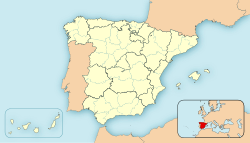Inestrillas
| Aguilar del Río Alhama | |
|---|---|
| Village and province | |

Panoramic view of the village and the Asunción church
|
|
 |
|
| Coordinates: 41°57′42″N 1°59′40″W / 41.96167°N 1.99444°WCoordinates: 41°57′42″N 1°59′40″W / 41.96167°N 1.99444°W | |
| Country |
|
| Region | Rioja Baja |
| Comarca | Cervera |
| Government | |
| • Mayor | Tovías Ramón Martínez López (PP) |
| Area | |
| • Total | 54.11 km2 (20.89 sq mi) |
| Elevation | 642 m (2,106 ft) |
| Postal code | 26530 |
| Website | Aguilar del Río Alhama |
Aguilar del Río Alhama is a village in the province and autonomous community of La Rioja, Spain. The municipality covers an area of 54.11 square kilometres (20.89 sq mi) and as of 2011 had a population of 549 people. It is located in a low altitude mountainous area, in the foothills of the Iberian System. It belongs to the region of Rioja Baja and is washed by the waters of the Alhama river.
The municipality is located in the extreme southeast of La Rioja, in the foothills of the Sierra del Pelago. It is bordered to the north and east by Cervera del Rio Alhama, west (from N to S) by Valdemadera and Navajún, and to the south by four municipalities in Soria province (from W to E), Cigudosa, San Felices, Dévanos and Ágreda.
The earliest record of the municipality dates from the 12th century when it was incorporated into Castile in 1198.
In 1269 Theobald II of Navarre included it in the jurisdiction of Viana and granted a weekly market on Tuesdays.
In 1271 Henry I of Navarre ordered the residents of the village of Rio to relocate to the village to form a single municipality. In 1273 Pedro Sanchez de Monteagut, lord of Cascante, who owned the village, donated it to King Henry.
In 1302 toll collectors from Tudela claimed rights over the village as a result of which they complained to Alfonso Robray, governor of Navarre, who ordered them not to worry.
In the 14th century, it was integrated into the lordship of Cameros. John II, in 1452, liberated the entire village from the perpetual tax on wine which they sold, for having been faithful, although they may have experienced theft, arrest or were killed.
...
Wikipedia
